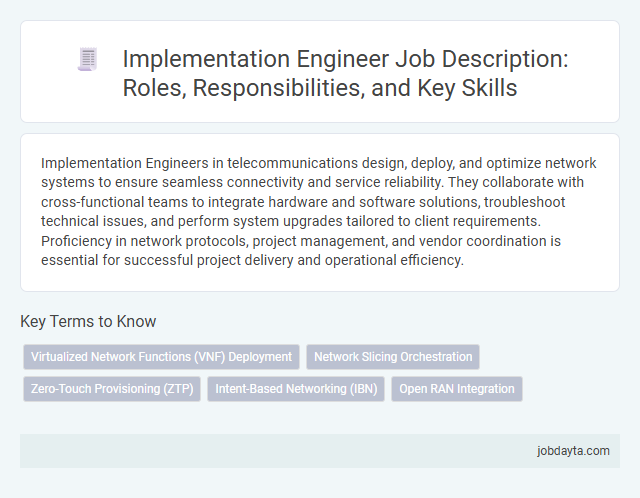Implementation Engineers in telecommunications design, deploy, and optimize network systems to ensure seamless connectivity and service reliability. They collaborate with cross-functional teams to integrate hardware and software solutions, troubleshoot technical issues, and perform system upgrades tailored to client requirements. Proficiency in network protocols, project management, and vendor coordination is essential for successful project delivery and operational efficiency.
Overview of an Implementation Engineer in Telecommunications
What does an Implementation Engineer in Telecommunications do? An Implementation Engineer designs and deploys telecommunication systems to ensure seamless network integration. You play a critical role in managing infrastructure setups, troubleshooting, and optimizing performance for communication networks.
Key Roles and Responsibilities of Implementation Engineers
Implementation Engineers play a critical role in deploying telecommunication systems and solutions effectively. Their expertise ensures seamless integration and optimal performance of network infrastructure.
- System Installation and Configuration - Implementation Engineers are responsible for installing and configuring telecommunication hardware and software to meet project specifications.
- Network Testing and Validation - They conduct thorough testing and validation to guarantee network integrity and compliance with performance standards.
- Technical Support and Troubleshooting - You provide ongoing technical support and resolve issues during and after deployment to maintain system reliability.
Essential Technical Skills for Implementation Engineers
| Essential Technical Skills for Implementation Engineers in Telecommunication |
|---|
|
Project Lifecycle Management in Telecom Implementation
An Implementation Engineer in telecommunication manages the entire project lifecycle from planning to deployment, ensuring seamless integration of network infrastructure. They coordinate with cross-functional teams to implement solutions that meet technical specifications and regulatory standards. Their role is critical in optimizing project timelines, reducing risks, and guaranteeing operational efficiency during telecom network rollouts.
Collaboration with Cross-Functional Teams
Implementation Engineers in telecommunication work closely with cross-functional teams including network architects, software developers, and quality assurance specialists to ensure seamless deployment of communication systems. Their role involves coordinating project timelines, resolving technical challenges, and aligning implementation strategies with business objectives. Effective collaboration enhances system reliability, optimizes network performance, and accelerates service delivery.
Troubleshooting and Problem-Solving Techniques
Implementation Engineers play a critical role in telecommunication projects by ensuring seamless integration and operation of network solutions. Expertise in troubleshooting and problem-solving techniques minimizes downtime and enhances network performance.
- Root Cause Analysis - Identifying underlying issues quickly to prevent recurring problems ensures system reliability.
- Diagnostic Tools Utilization - Leveraging advanced network analyzers and protocol testers speeds up error detection and resolution.
- Collaborative Problem Resolution - Coordinating with cross-functional teams improves solution accuracy and deployment efficiency.
Tools and Technologies Used by Implementation Engineers
Implementation Engineers in telecommunication rely heavily on specialized tools and technologies to ensure seamless network deployment and integration. Common software includes OSS (Operational Support Systems), network simulation tools, and configuration management platforms.
You utilize scripting languages like Python and automation frameworks to streamline installation and testing processes. Hardware tools, such as protocol analyzers and signal testers, enhance accuracy in troubleshooting and validation tasks.
Importance of Documentation and Reporting
Implementation Engineers play a crucial role in the telecommunication industry by ensuring that network solutions are deployed efficiently and effectively. Accurate documentation and detailed reporting are essential for maintaining project clarity and tracking progress.
Clear documentation streamlines communication between teams and facilitates troubleshooting during and after implementation. Reporting provides a comprehensive record of configurations, changes, and issues that can prevent costly errors and downtime. Your commitment to precise documentation supports ongoing maintenance and future upgrades, enhancing overall network reliability.
Certifications and Training for Implementation Engineers
Implementation Engineers in telecommunication play a critical role in deploying network solutions efficiently. Certification and ongoing training ensure they remain updated on the latest technologies and best practices.
- Certified Network Technician (CNT) - Validates expertise in configuring and troubleshooting telecommunication networks.
- Project Management Professional (PMP) - Enhances skills in managing implementation projects within scheduled timelines and budgets.
- Vendor-Specific Training - Provides specialized knowledge on equipment and software from major telecommunication providers.
Your commitment to acquiring these certifications directly contributes to successful project deployments and system reliability.
Career Growth and Opportunities in Telecommunications Implementation
Implementation Engineers in telecommunications design, deploy, and optimize network systems to ensure seamless connectivity. Their role involves integrating advanced technologies like 5G, fiber optics, and IoT devices to meet evolving communication demands.
Career growth in telecommunications implementation offers opportunities to specialize in network architecture, project management, and technical consulting. Professionals can advance to senior engineer roles, operations management, or technical leadership positions within global telecom firms.
Related Important Terms
Virtualized Network Functions (VNF) Deployment
Implementation Engineers specializing in Virtualized Network Functions (VNF) deployment ensure seamless integration and configuration of VNFs within telecom infrastructures, optimizing network scalability and performance. Their expertise in automation tools, orchestration platforms, and cloud-native environments drives efficient rollout and management of virtualized services.
Network Slicing Orchestration
Implementation Engineers specializing in Network Slicing Orchestration design and deploy virtualized network segments to optimize resource allocation and enhance service flexibility across 5G infrastructures. They utilize advanced orchestration platforms such as ONAP and ETSI MANO to automate slice lifecycle management, ensuring seamless integration and performance compliance in multi-tenant environments.
Zero-Touch Provisioning (ZTP)
Implementation Engineers specializing in Zero-Touch Provisioning (ZTP) automate device configuration across telecommunication networks, significantly reducing manual setup time and minimizing errors. Their expertise in integrating ZTP systems ensures efficient large-scale deployment, enhancing network scalability and operational agility.
Intent-Based Networking (IBN)
Implementation Engineers specializing in Intent-Based Networking (IBN) design and deploy automated network solutions that translate business intentions into precise network configurations, enhancing operational efficiency and reducing human error. Their expertise in AI-driven policy enforcement and real-time analytics ensures seamless orchestration of complex telecommunication infrastructures, driving adaptive and resilient network performance.
Open RAN Integration
Implementation Engineers specializing in Open RAN Integration deploy and configure interoperable, multi-vendor radio access network components to enhance network flexibility and reduce operational costs. They utilize standards like O-RAN Alliance specifications to ensure seamless integration of hardware and software modules, optimizing network performance and supporting 5G scalability.
Implementation Engineer Infographic

 jobdayta.com
jobdayta.com